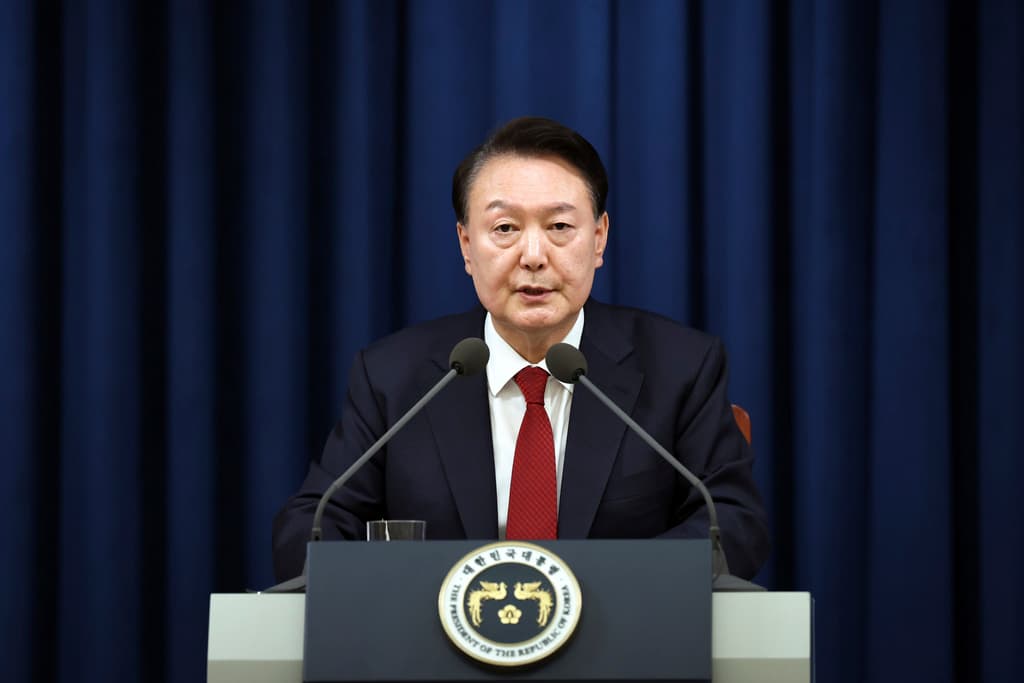South Korean President Seen as ‘Done’ After Imposing and Then Withdrawing Martial Law
As if the resurgent political opposition were not enough of a problem, President Yoon has to face up to the hostility of leading members of his own People Power Party.

South Korea’s president, Yoon Suk-yeol, now is fighting to keep his job after the fiasco of the six hours of martial law he imposed Tuesday and then withdrew early Wednesday when he realized not even his own party was fully behind him.
South Koreans are going about business as usual while tens of thousands of policemen guard central Seoul against the likelihood of leftist-led mass protests calling for either his resignation or impeachment. A conservative, Mr. Yoon has been struggling to ram legislation through a national assembly dominated by the Minjoo, or Democratic Party, which enjoys a wide majority in the assembly and easily blocked his martial law decree.
The government fears a return to the period in late 2016 and early 2017 that led to the ouster of the previous conservative president, Park Geun-hye, and an election in which a liberal, Moon Jae-in, came out victorious and served for five years as president before the election of Mr. Yoon by a slim margin in 2022.
Protesters have taken to the streets of Seoul and other cities, carrying electronic candles in paper cups while staging “candlelight vigils,” as they did in the drive against Ms. Park. If the past is prologue, the protests could well grow to similar historic levels unless Mr. Yoon steps down.
“I think Yoon is done,” a long-time Korea watcher, Victor Cha, in charge of Korean issues at the Center for Strategic and International Studies, told the Sun. “Hard to survive this,” he added in an email message.
If the protests are anything like those against Ms. Park, huge crowds will surge down the main avenue between the historic royal palace and the central plaza in front of city hall.
The protests are likely to be reasonably orderly, with none of the extreme violence that characterized the uprising in the southwestern city of Gwangju in May 1980 while the country was under martial law after the assassination of Ms. Park’s father, the long ruling dictator, Park Chung-hee. After protesters took over the entire city, army troops moved in, killing as many as 200 of them.
As if the resurgent political opposition were not enough of a problem, though, Mr. Yoon has to face up to the hostility of leading members of his own People Power Party. The party chief, Han Dong-hoon, after advising against Mr. Yoon’s martial law decree, now is calling for Mr. Yoon to resign from the party.
Mr. Yoon appeared increasingly isolated after all members of his cabinet and most of his senior advisers resigned. He dismissed his defense minister, KimYong-hyun, who had urged him to declare martial law and ordered soldiers to surround the national assembly in a futile effort to keep the opposition from voting down the martial law decree.
“Taking responsibility for all the turmoil caused by the emergency martial law,” Mr. Kim said, looking contrite. “The people are recovering their daily lives,” Seoul’s Yonhap News quoted him as saying, “but the domestic political situation and security circumstances are not easy.”
The opposition in the assembly has formally opened the campaign to drive Mr. Yoon from office, presenting an impeachment motion on which the assembly must act in the next two days.
The drive for impeachment promises to be fast and furious. At least 200 of the 300 assembly members would need to vote for impeachment for it to happen. The Democratic Party can muster 192 votes, including those of minor far-left parties, and would need members of Mr. Yoon’s party to defect to its side, as a few of them did in voting against the martial law decree. Then the impeachment motion goes before the constitutional court, six of whose nine members would have to approve it.
Then what? The biggest winner would be the Democratic Party leader, Lee Jae-myung, who lost by an eyelash in the 2022 presidential election. Mr. Lee is eager to run again — in the next scheduled election in 2027, or much sooner if Mr. Yoon is ousted.
Mr. Lee’s record, though, raises questions. He’s been found guilty, and given a suspended sentence, for making false statements during his campaign and faces three charges for corruption in real estate scandals in which potential witnesses have died mysteriously.

